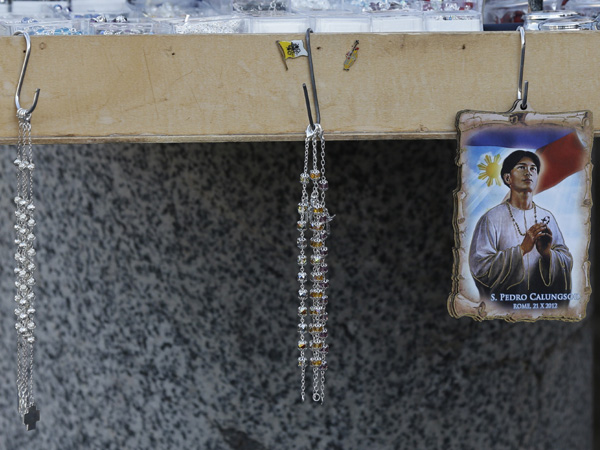Pope to name 7 new saints, seeks to revive faith

An icon of Pedro Calungsod, of the Philippines, hangs from a stall at the Vatican, Saturday, Oct. 20, 2012. Calungsod will be declared a saint along with six others in a ceremony presided over by Pope Benedict XVI at the Vatican on Sunday. AP/Alessandra Tarantino
VATICAN CITY – Pope Benedict XVI is adding seven more saints, including Pedro Calungsod, onto the roster of Catholic role models as he tries to rekindle the faith in places where it’s lagging.
Two of them are Americans: Kateri Tekakwitha, the first Native American saint from the U.S. and Mother Marianne Cope, a 19th century Franciscan nun who cared for lepers in Hawaii. A third is a rather unlikely saint, Calungsod, a Filipino teenager who helped Jesuit priests convert natives in Guam in the 17th century but was killed by spear-wielding villagers opposed to the missionaries’ efforts to baptize their children.
The ceremony Sunday in St. Peter’s Square has drawn pilgrims from around the world to Rome and coincides with a Vatican meeting of the world’s bishops on trying to revive Christianity in places where it’s fallen by the wayside.
Several of the new saints were missionaries, making clear the pope hopes their example will be relevant today as the Catholic Church tries to hold onto its faithful in the face of competition from evangelical churches in Africa and Latin America, increasing secularization in the West and disenchantment with the church over the clerical sex abuse scandal in Europe and beyond.
Benedict will canonize the seven just before the start of Sunday’s Mass, reciting the ritual formula in Latin in which he declares each one a saint and “decreeing that they are to be venerated as such by the whole church.” For several days now, tapestries with each of their images have hung from St. Peter’s Basilica.
The two Americans actually hail from roughly the same place — what is today upstate New York — although they lived two centuries apart.
Known as the “Lily of the Mohawks,” Kateri was born in 1656 to a pagan Iroquois father and an Algonquin Christian mother. Her parents and only brother died when she was 4 during a smallpox epidemic that left her badly scarred and with impaired eyesight. She went to live with her uncle, a Mohawk, and was baptized Catholic by Jesuit missionaries. But she was ostracized and persecuted by other natives for her faith, and she died in what is now Canada when she was 24.
Cope is revered among many Catholics in Hawaii, where she arrived from New York in 1883 to care for lepers on Kalaupapa, an isolated peninsula on Molokai Island where Hawaii governments forcibly exiled leprosy patients for decades. At the time, there was widespread fear of the disfiguring disease, which can cause skin lesions, mangled fingers and toes and lead to blindness.
Cope, however, led a band of Franciscan nuns to the peninsula to care for the patients, just as Saint Damien, a Belgian priest, did in 1873. He died of the disease 16 years later and was canonized in 2009.
Two-hundred fifty pilgrims from Hawaii traveled to Rome for Mother Marianne’s canonization, including nine Kalaupapa patients.
Another pilgrim was Sharon Smith, of Syracuse, New York, whose 2005 cure from complications from pancreatitis, an inflammation of the pancreas, was declared medically inexplicable by the Vatican — the “miracle” needed for Mother Marianne to be named a saint. In an interview last week, Smith recounted how she had fainted one day in her home, an allergic reaction to medication she was taking for a kidney transplant, and awoke in the hospital to find that doctors weren’t giving her much time to live.
Her disease was eating away at her insides, causing her stomach to detach from her intestines. Doctors said they couldn’t repair it. At a certain point, a nun pinned a bag of ashes and dirt from Mother Marianne’s grave on her and prayed.
“I had never heard of her, but we continued to pray,” Smith said. “And I just, I started getting better.”
“I believe in miracles, but I don’t know whether it was all the prayers, or the pinning of the relic, but I know that something worked and I’m here for some reason,” Smith said.
The Vatican’s complicated saint-making procedure requires that the Vatican certify a “miracle” was performed through the intercession of the candidate — a medically inexplicable cure that can be directly linked to the prayers offered by the faithful. One miracle is needed for beatification, a second for canonization.
The other new saints are: Jacques Berthieu, a 19th century French Jesuit who was killed by rebels in Madagascar, where he had worked as a missionary; Giovanni Battista Piamarta, an Italian who founded a religious order in 1900 and established a Catholic printing and publishing house in his native Brescia; Carmen Salles Y Barangueras, a Spanish nun who founded a religious order to educate children in 1892; and Anna Schaeffer, a 19th century German lay woman who became a model for the sick and suffering after she fell into a boiler and badly burned her legs. The wounds never healed, causing her constant pain.
